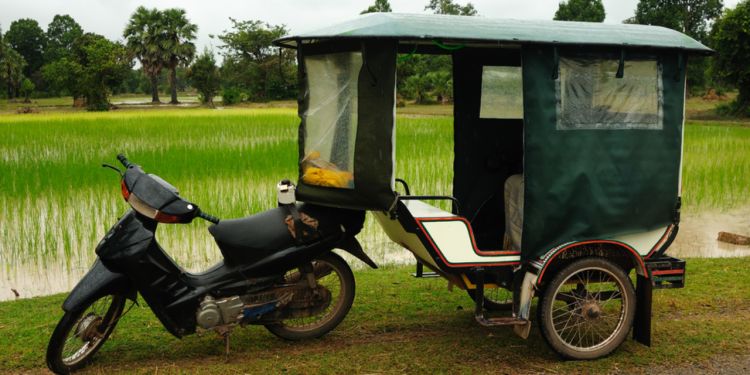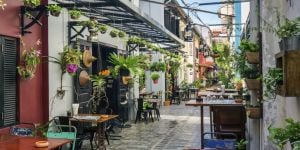
In spite of a relatively undeveloped public transport system, Cambodia is one of the easiest countries to get around. Thanks to a plethora of affordable options, you'll never be short of ways to move from A to B in the cities, or to travel across the country to explore its many wonders.
Cities in Cambodia are relatively small compared with many other countries, so they are quite easy to navigate and you can even walk or cycle to many popular places, depending on where you live. However, traffic is increasing as the population and development increases, and more luxury SUVs are hogging the way (mainly driven by Cambodian officials).
Do be careful when on the roads in Cambodia ' whether as a driver, a passenger or a pedestrian ' as few road regulations are followed, and it's not uncommon to witness traffic violations, such as driving down the wrong side of the road or turning without indicating!
Types of transport
The main ways that many locals and expats choose to make their way about town is by tuk-tuk (carriages pulled by motorbikes), on the back of a motorbike, called a moto-dop (often abbreviated to moto), which translates to 'motorbike carrier', or by rickshaw, a motorized 3-wheeler running on LPG. There is no need to discuss fares for the rickshaw, since at the end of the ride, a message comes on the phone stating the fare, which is a lot cheaper than tuk-tuks. Unlike in Bangkok, where the motorbike drivers wear fluorescent vests and congregate at specific areas, Cambodia's moto drivers are dressed normally and often hang out in groups on corners, or slow down to see if you want a ride as they drive past. Some people make their living as a moto-dop driver and will call out to you when they see you, while others may just notice you as they're passing by and seize the opportunity to make a couple of dollars. As a passenger, you can ride side-saddle or facing forward, and most moto drivers are willing to take two passengers for a bit of extra money, which makes it a cheap mode of transport if you're travelling with a slim friend.
If you do find a tuk-tuk or moto-dop driver that you are particularly happy with, or you need to make a regular journey, such as to work, you can also organise for them to meet you each day for a fixed fee (or you may find that they take the initiative to do so themselves). However, before ever hopping into a tuk-tuk or getting on a moto, be sure to have agreed on a price.
A little bit of Khmer can go a long way when travelling by these means, as many moto-dop and tuk-tuk drivers do not speak any English ' particularly if you wave them down in an area that isn't popular with tourists or expats. It's also a good idea to have a basic idea of where you need to go, as many drivers will say that they know a place, but actually have no idea (it's not like London where all black cab drivers must pass a test to prove they have a thorough knowledge of the city). In their defence, some addresses aren't very clear in Cambodia, as two houses on the same road can have the same number. And in Phnom Penh, the grid system doesn't always follow much logic. Most roads are named by number ' for example, Street 19 ' but don't expect neighbouring streets to always follow a numerological sequence.
It's a good idea to pick up a map from a restaurant or guesthouse when you arrive so that you have a rough idea of where you want to go or can simply point out your destination. Learning some basic instructions, such as 'please turn right/please turn left' (som bot sadam/som bot chweng) can also help if your driver has trouble understanding your pronunciation of a name, or doesn't know where it is. Then you can simply direct them to your destination.
By law, all moto drivers need to wear a helmet, but it's advisable for the passenger to do so too, and it's worth investing in a good one if you plan to get around this way while in Cambodia. As soon as you arrive in the country, you are likely to spot motorbikes piled high with goods or people. You can see anything from pigs and wardrobes being balanced precariously across a moto, to patients on IV drips, and families of five (with three children sandwiched between the adults) zooming by. A great photo journal that will give you an idea of this is called Carrying Cambodia.
Cambodia's private bus services make regional travel a breeze, and you can take an efficient and affordable mini-van or tourist bus to various destinations in the country or beyond. Alternatively, you can hire a car with a private driver to make a trip, and this will save you from needing to fit in with bus schedules. Shared taxis are also a common way to travel, and you can join the Facebook group, Taxi Share Cambodia, to find drivers and organise booking a shared taxi with fellow travellers.
As of 2015, public buses started running along three routes, and are cheap and air-conditioned, albeit very slow as they stop frequently and don't make much headway during rush hour.
There are now taxi-hailing services in Phnom Penh, Sihanoukville, and Siem Reap. Private taxis used to be mainly found at airports, but 2017 saw the arrival of Uber and Grab, then Grab bought out Uber. PassApp Taxi is another useful transport app that works in the same way, and a big upside to both these apps is that they save you from negotiating prices with drivers. Furthermore, the CNG-fuelled tuk-tuks that you can catch through PassApp tend to be cheaper than normal tuk-tuks. Sadly, petty crime is still an issue in Cambodia, and bag or phone snatching is common when you are travelling around, so taking a taxi at night can be a worthwhile safety measure. If you download the Grab app, you can book cars, tuk-tuks, motorbike taxis, and moto-dops, then pay in cash once you reach your destination.
Alternatively, you could rent or buy your own moto, dirtbike or car while living in Cambodia, then you will have the independence to come and go as you please. Do note, however, that if you live in an old apartment block, it's unlikely to come with parking facilities. And be wary that crooked police officials are often waiting for any chance to fine foreigners for traffic violations, and they aren't afraid to make up an offence if they think you may not know better. If you are stopped, try not to hand over your licence or ID to a police officer, and try to quickly pocket the key as soon as you've come to a halt, so that it cannot be confiscated and leveraged for a higher fine.
Train
To date, the country hosts one of South-East Asia's most ramshackle train networks. However, you can still access these in Phnom Penh at the end of the 108 and 106 roads. In general, the Battambang route is available only once a week, that is, on Saturday, as from 6.10 am and it comes back the next day around 5.20 pm.
In addition, there are trains running from Phnom Penh to Sihanoukville and vice versa (only on the weekends), between Phnom Penh and Poipet [Thai border] and vice versa, and from the Phnom Penh main railway station to Phnom Penh International Airport and vice versa.
Boat
Unless you go through a specialist company or a travel agency, you can purchase boat tickets from Angkor Express and Siem Reap. There is a ferry service from Russy port to Kandal province, with three stops in Phnom Penh, soon to be four.
Costs
Getting around Phnom Penh is relatively cheap and easy, so most expats are happy to simply jump in tuk-tuks or on motos when need be ' particularly as this means they don't have to worry about theft, parking or drink driving.
A tuk-tuk ride can cost anything from US$2 per person, depending on where you are headed. A moto-dop ride tends to be a much cheaper alternative, and can cost upwards of KHR2,000 for a ride. Renting your own motorbike can work out as a more affordable option if you intend to do lots of riding about town.
Buses have drastically improved in Cambodia in recent years, and many companies, such as Giant Ibis, operate comfortable air-conditioned buses and mini-buses that travel to most parts of the country for under US$20. You can also take a bus to bordering countries ' an overnight bus from Phnom Penh to Bangkok will cost you around US$30.
Useful links:
We do our best to provide accurate and up to date information. However, if you have noticed any inaccuracies in this article, please let us know in the comments section below.








